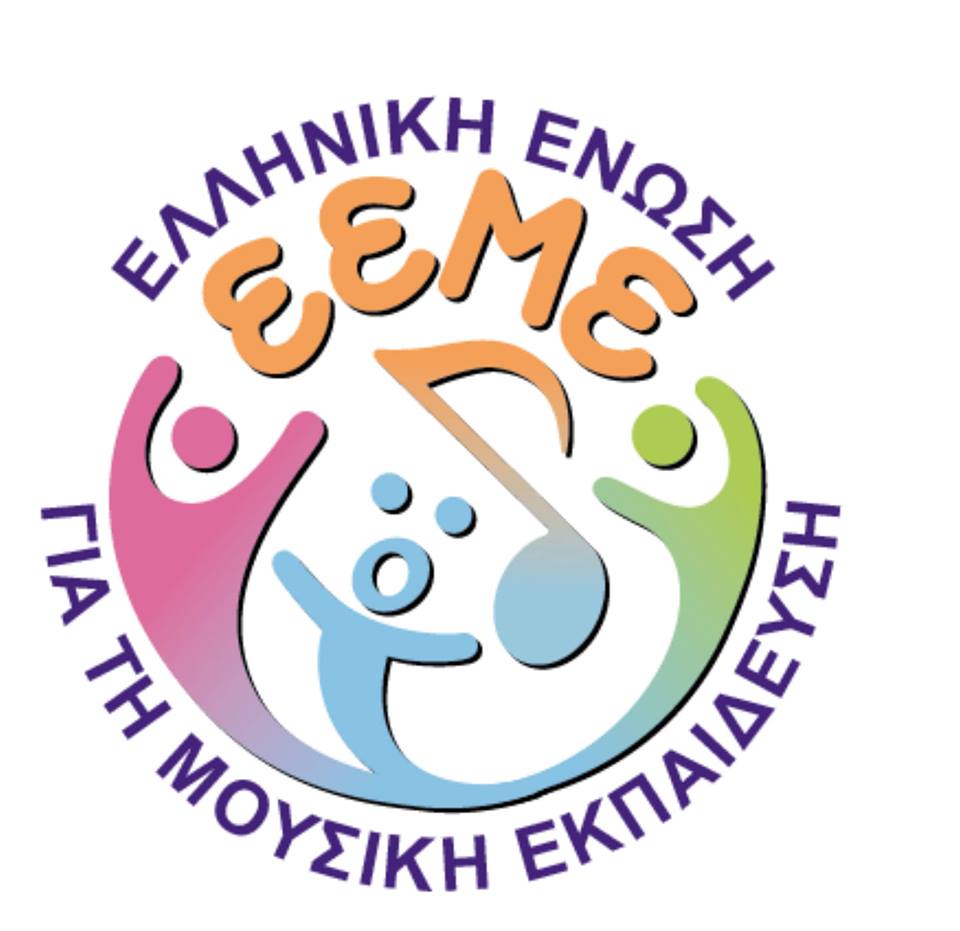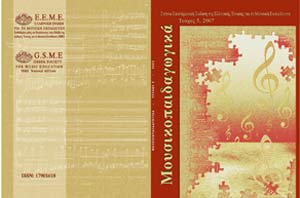1) May Kokkidou: The Assessment of Learning Process in School Music Education: a Comparative Study according to European Music Curricula.
2) Lelouda Stamou, Jere T. Humphreys, Charles R. Schmidt: The effect of a professional development program on Greek music teachers' self-assessed research knowledge, ability, and interest towards research.
3) Anthoula Koliadi-Tiliakou: The relation of Music Self-Concept with Self Esteem of Music School students.
4) Despina Bouldi: Music and Emotion: Explanatory Approaches, reflections and applications.
5) Georgios Likesas, Vasiliki Tirovola: The position of traditional dancing in primary school curricula and its practical implementation.
Abstracts:
1) May Kokkidou
The Assessment of Learning Process in School Music Education: a Comparative Study according to European Music Curricula
Assessment in education comprises a very powerful instructional tool. Recently, the assessment of learning process in not considered as identical to student's outcomes evaluation but aims to give feedback to students and to inform teachers about the circumstances that dominate teaching-learning process and student's difficulties and weaknesses, so they can proceed to certain interposing acts. The issue of assessment in school music education concerns few theoreticians, researchers and music educators who mainly focalize in the ways that assessment could enhance the establishment of a dialectic relationship between child and music creation and child's openness and lifelong interest for the art of music. The current tendencies about assessment of learning process in school music education focus in standards development in regard to what students can achieve and promotes the "portfolio technique". Additionally, there is an increasing interest about student's attitudes in regard to various music styles appreciation, about student's wish to express themselves through music and to be creative, about student's abilities to express their feelings and, finally, about student's willingness for participation to music activities. In this particular research we have studied and comparatively examined the ways for assessing the learning process for the music course, as they are explicitly expressed, or emerged, in the music curricula of seven countries regions of Europe. The research is aiming at the deeper comprehension of specific aspects of the educational process within the field of school music education.
2) Lelouda Stamou, Jere T. Humphreys, Charles R. Schmidt
The effect of a professional development program on Greek music teachers' self-assessed research knowledge, ability, and interest towards research
The study aimed at investigating the effect of a professional development program in research and selected background variables on Greek music teachers' self-assessed research knowledge, ability, and interest towards research. Participants were 41 music teachers teaching in public schools, conservatories, and universities. The research training program was part of a broader research project and consisted of four seminar meetings summing up to 16 hours of instruction that took place in a Greek university The contents of the seminars covered theoretical knowledge in the quantitative research paradigm, an introduction and acquaintance with basic statistical concepts and procedures, with important music aptitude tests and their administration, as well as acquaintance with basic principles in test standardization. Participants committed to full seminar attendance and participation in the administration of music aptitude tests in their own teaching environments, thus contributing to data collection for the standardization of the tests in Greece. Research results showed that there was no significant pre-seminar difference in self-assessed interest and ability in research between participants who had and had not taken a prior research course. However, participants with prior training scored significantly higher on self-assessed knowledge of selected research concepts. A mixed model analysis of variance indicated that the seminar instruction was effective in improving self-assessed research knowledge and interest, and that those with previous research training improved more than those without such training.
3) Anthoula Koliadi-Tiliakou
The relation of Music Self-Concept with Self Esteem of Music School students
The present study is based on the general consensus about the importance of positive self-image and its contribution to the development of children's personality, as well as on the notion about the importance of music education for children's emotional development. The general aim of the research is the examination of the relationship between music education and Music School student's general self esteem. Specifically, music self-concept (children's view of their musical abilities) is examined in relation to their general self esteem. The first objective of the research is the analysis of the relationship between: a) "Music Self-Concept" and "General Self-Esteem", b) "sub-domains of "Music Self-Concept" and "General Music Self-Concept" and c) "Music Self-Concept", "General Self-Esteem" and "Gender" of Music School Students. The second objective is the exploration of group differences regarding General Self-Esteem among Music School Students and Non-Music School Students. Data analysis showed: a) a positive relationship between Music Self-Concept (and specific sub-domains of Music Self-Concept) and General Self-Esteem of Music School students, b) students associate intellectually specific sub-domains of music self-concept with their general musical ability, c) statistically significant differences among boys and girls, with girls showing higher music self-concept and d) statistically significant differences among Music School Students and Non-Music School Students, with Non-Music Students showing higher General Self-Esteem. The importance of the development of higher Music Self-Concept, as well as the necessity of upgrading music educational practices in order to achieve a better self-image is considered. Finally, there are suggestions for music teachers concerning the development of high Music Self-Concept and its sub-domains, as well as the General Self Esteem of their students.
4) Despina Bouldi
Music and Emotion: Explanatory Approaches, reflections and applications
The present study explores the relationship between music and emotions and examines the basic philosophical and non philosophical theories which tried from times to times to interpret this kind of relationship. The theories that disconnect emotions and music are reported and so do those which support the music's expressive character. This analysis presents the importance of music's emotional experiences for the comprehension of her aesthetic value and finally, describes the music's practical contribution, in order to be achieved students' aesthetic and emotional cultivation.
5) Georgios Likesas, Vasiliki Tirovola
The position of traditional dancing in primary school curricula and its practical implementation
The aim of the present paper is to study the extent to which students take part in traditional Greek dancing classes at primary school and also the position of traditional dancing in school curricula. The objective of lessons in traditional Greek dancing is to create a continuum in Greek dancing tradition, with students as its representatives and supporters. Education should not only be used to convey cognitive and cultural information, but should also serve to formulate people with awareness and creativity in society, who will learn to respect the traditions and popular culture of their country. It should also organize, provide information on and preserve a large part of its cultural heritage and function as a place that socializes and initiates students into the values and conducts of society. It is very important for lessons in traditional Greek dancing to take place through an interdisciplinary approach, involving aesthetic education (music -drama -visual arts) and environmental education, so that it can convey and transfer elements of a country's cultural traditions and heritage, knowledge of history, folklore and geography, and also contribute to its cultural identity and play a decisive role in formulating the "cultural being" of society. Furthermore, it is considered a basic medium for the preservation and dissemination of history and cultural development, as students learn to appreciate, respect and safeguard the roots of their past, and acquire a social and cultural consciousness. For these reasons, dancing within the framework of education should take on the meaning of continuous creative and free movement and expression for children.






 Please wait...
Please wait...